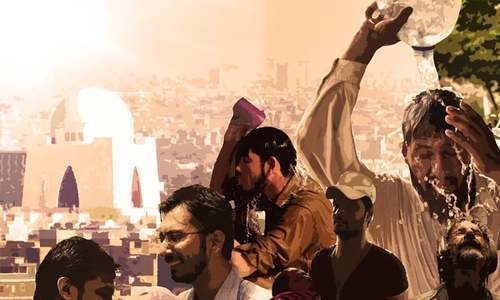KARACHI:
The Pakistan Meteorological Department today has issued a heatwave alert for Karachi till April 3 with a forecast of daytime temperatures rising to 39-41ºC.
“Sea breeze is cut off while hot and dry winds of Balochistan are entering the city,” the meteorological department added.
The PMD has advised the citizens to drink more water and to avoid direct sunlight from 11am to 4pm to reduce the risk of heatstrokes.
Meanwhile, the air quality of the port city has also significantly reduced as according to the air quality index, Karachi is the fourth most polluted city in the world with a particulate matter level recorded at 164.
According to the index, a score of 151 to 200 is harmful to health, 201 to 300 is extremely harmful whereas more than 301 indicates dangerous air quality.
The increase in air pollution was due to the closure of sea breezes and the winds from Balochistan.
Earlier, the National Disaster Management Authority (NDMA) urged the provincial disaster management authorities (PDMAs) and local authorities to take effective response measures to mitigate the impact of imminent heatwave expected in some areas of the country this week.
Quoting the meteorological department, the NDMA has warned that the first heatwave of the season is likely to grip the plains of Sindh, southern Punjab, eastern and southern Balochistan from Tuesday to Saturday.
“Temperatures are most likely to soar in sub-mountainous areas of the country. Dust raising winds are also expected in Sindh and Balochistan during the period,” said a press release issued by the NDMA on Tuesday.
The PDMAs and other relevant authorities have been asked to establish heatstroke stabilisation centres and relief centres at government and private hospitals, basic, rural health units or any available government buildings and community centres by ensuring basic facilities there.
The local authorities have been asked to improve coordination with emergency services and different departments, besides enhancing awareness campaign to educate the public on preventive measures, the press release added.
“A helpline should be set up to assist the affected people on a priority. General public, especially heatstroke victims should be provided water and necessary emergency medicines. The people especially farmers should be warned about possible dust storm during harvesting and threshing.”









